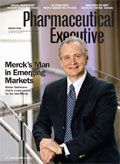All Things to All People?
Pharmaceutical Executive
Is it possible to remain commercially relevant just as a developer and distributor of drugs? Are there equivalent profits in a larger set of commitments?
In an industry as important to the world's future as biopharmaceuticals, public perceptions count. There was unanimity on this score when the 35 members of Pharm Exec's Editorial Advisory Board met on January 21 for a "heads up" review of issues facing the industry in 2010. But as the discussion proceeded, it became apparent there are underlying—and unresolved—questions about the industry's evolving identity as a commercial enterprise.

William Looney
Specifically, are biopharmaceuticals really a part of the big business of healthcare? Are medicines an isolated commodity purchase—or an integrated service focused on delivering better health outcomes for society? In a world of hardening definitions of "value," is it possible to remain commercially relevant as a simple developer and distributor of drugs? And are there equivalent profits to be had in steering the business model toward a larger set of commitments, essentially being "all things to all people"? In his corporate blog, EAB member Jason Burke, director of health and life sciences for SAS Institute, noted that an industry bent on forging synergistic ties to the full healthcare community may well be "a vision at odds with reality."
Repositioning the industry's mindset from that of a supplier to a driver of health solutions must address three historic constraints. The first is deconstructing regulatory controls that require third parties to manage most contacts with the customer base.
The second constraint is the way medicine costs are targeted against other segments of the healthcare chain. When payers seek to plug a budget gap, drugs are always the "lender of first resort." This fosters the attitude that medicines are not embedded in the continuum of care provided by physicians and hospitals—indeed, it suggests that medicines are "discretionary."
Third is the inability to quantify whether or not a broader health system strategy can deliver the high margins industry relies on to commercialize life-saving technologies. Supplementing drug marketing and distribution with a range of supportive services is expensive, and there is added risk in guaranteeing to the payer that a new medicine will secure a metric-driven health outcome.
However, the industry may have no choice but to abandon its stand-alone strategy for broader engagement in the business of healthcare. Consolidation of the payer base and the more prominent role of government in allocating healthcare purchases means that the customer interest is the public interest; no provider wants to be left out of that equation. This was a key driver behind the abrupt shift in PhRMA's position last year to support the Obama Administration's goal of universal health insurance.
Another factor is the strategic shift of Big Pharma toward business segment diversification. With portfolios that now offer everything from complex orphan drugs to chronic care off-patent brands, as well as OTC medicines and nutritionals, the incentive is to serve the full range of customer needs. Hence the emphasis on providing networked "solutions" rather than units of blister packs.
In occupying this new space, the industry must put laser-like focus on one mission: to enhance the breadth, content, objectivity, and relevance of medicines information, thereby informing the bewildering choices that payers, providers, and patients make largely in the dark. And industry still has to make the case for partnership.
To support our readership, Pharm Exec has initiated a series of webcasts, podcasts and videos built on better leveraging analytics to meet customer expectations. I urge you to visit pharmexec.com to gauge the full offering.
William Looney
Editor-in-chief
Addressing Disparities in Psoriasis Trials: Takeda's Strategies for Inclusivity in Clinical Research
April 14th 2025LaShell Robinson, Head of Global Feasibility and Trial Equity at Takeda, speaks about the company's strategies to engage patients in underrepresented populations in its phase III psoriasis trials.
Merck’s Oral TLR7/8 Inhibitor Reduces Disease Activity in Cutaneous, Systemic Lupus
May 21st 2025Results from the Phase II WILLOW trial show that enpatoran achieved a statistically significant dose-response and clinically meaningful reduction in disease activity in cutaneous and systemic lupus erythematosus with active rash.
Beyond the Prescription: Pharma's Role in Digital Health Conversations
April 1st 2025Join us for an insightful conversation with Jennifer Harakal, Head of Regulatory Affairs at Canopy Life Sciences, as we unpack the evolving intersection of social media and healthcare decisions. Discover how pharmaceutical companies can navigate regulatory challenges while meaningfully engaging with consumers in digital spaces. Jennifer shares expert strategies for responsible marketing, working with influencers, and creating educational content that bridges the gap between patients and healthcare providers. A must-listen for pharma marketers looking to build trust and compliance in today's social media landscape.
